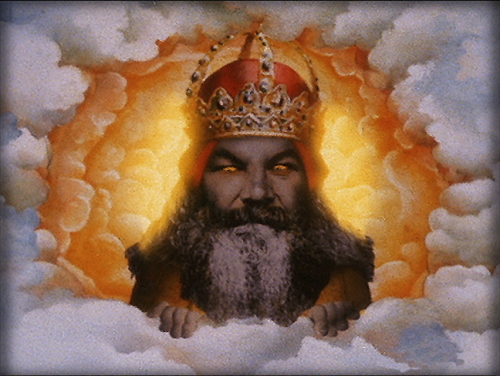Today, we will be remembering one of the great tragedies in the history of our nation. Ten years ago, a senseless act of violence turned tools of travel into tools of terror. Many people died. Some instantly, some slowly and in much pain.
Over the next few weeks, I tried to make sense of what I had witnessed. The world hadn't really changed much. There were always people who wanted to hurt others, but the reality of evil was much more tangible, more pungent even. Before, I had been able to ignore evil when it occurred to others, but this had hit home. This showed me the reality of pain and suffering all over the world.
I was struck by how futile our efforts at comfort can be. When tragedy strikes, people often ask bigger questions than they have before. But who, if anyone, has the answers to give authentic hope?
Failed Answers
| Mary Baker Eddy believed evil was an illusion. |
| William Provine believes there is no God, and thus, no ethics (or ways to measure good and evil). |
All of these answers are found lacking in the face of the horrors of suffering. As people jumped from the burning buildings, falling to their death, not a bone in my body did not react in shock at the evil of it all. Later as the buildings collapsed, trapping thousands in a dusty, fiery grave, it was clear evil was and is real.
A Better Answer
Christianity's answer to suffering and evil does not insult our intelligence or emotions. It does not pretend we are too dumb to understand the reality of evil, nor does it pretend evil does not exist and sweep it under the rug. Christianity knows that evil is a very real problem. Though evil and suffering are real, Christianity contends justice and good will triumph in the end. Christians have an authentic hope in seeing the end of evil and suffering.
The hope one has is only as good as the object in which the hope is placed. Psalm 146:5-6 sums up the source of hope for the Christian. Our hope is in the God of the universe, the Creator. We believe God will keep his promises regarding the future.
But what has God actually promised to do about evil and suffering? Although there are many passages which may give a Christian hope, two passages stand out to me. The first passage is Revelation 21:3-5. This passage promises that God will make his living place with man. As he dwells with his people, he will "wipe away every tear from their eyes, and death shall be no more, neither shall there be mourning, nor crying, nor pain anymore, for the former things have passed away." God is making things new again, and he promises "these words are trustworthy and true." This passage resonates with anyone who longs for the end of unnecessary pain. We know there is something wrong with this world. All is not as it should be. But the Christian is waiting, yearning, longing for the day in which all things will again be new, and the glory of God will be revealed in its fullest nature.
Reasons for Hope
I know many who read this will not be satisfied with the explanation of hope for the Christian. They may say, "If Christianity was true, these passages would give me hope, but I am not sure Christianity is true." The Christian should not be found speechless in cases like this. 1 Peter 3:15 tells us to be ready to give reasons for our hope to anyone who asks. As such, here are some reasons why I believe in God. And here is a post on the reality of the Resurrection of Christ, showing the truth of Christianity in particular. Many other people have even better posts about the reality of Christianity.
However, the most compelling reason for me personally has been my transformation through Christ. I grew up in a Christian home, and accepted the Messiah at an early age. He is my Lord and Savior, and He has consistently worked upon my heart a desire to serve Him better and more fully. While many have not tried or explored Christianity openly and decide it is false, I have tried it, and found it true.
So, I will yearn for Jesus to make all things new, I will groan for the future glory. I know my redeemer lives, and hope for the day when there will be no more pain, suffering, tears or 9/11s. I will remember 9/11/01, and all other pain and suffering, with a longing for the promises beyond.
_________________________________________________________________________________
This post is part of a coordinated effort on the part of Christian apologist bloggers. I hope my post has been helpful, but for more perspectives, check out the following:
- Atheism, Evil and Ultimate JusticeDo all roads (and flights) lead to God?
- Resources on the Problem of Evil
- Evil's Three Faces and a Christian Response
- Where Was God on 9-11? A response to Rabbi Kushner
- Did God Allow the Attacks on 9/11 for a “Greater Good”?
- The Two Ground Zeroes
- America After 9/11: Is Religion Evil?
- 9/11: "Full Cognitive Meltdown" and Its Fallout
- On September 11th, 2001 harmless things became fearful
- 9/11: Where Is God During A Catastrophe?
- Christianity and 9/11: Guilt by Association?
- Suffering and the Cross of Christ
- Remembering 9/11: A Young Californian’s Perspective
- Possible Worlds: The Need for Moral Choices and Consequences
- Ground Zero: Why truth matters for preventing another 9/11-style attack
- If God, Why Evil?
- My 9/11 Memorial: Christianity Offers Authentic Hope In The Face Of Suffering
- The Tiptoes of Tolerance
- 9-11, Jihad, and the Christian










